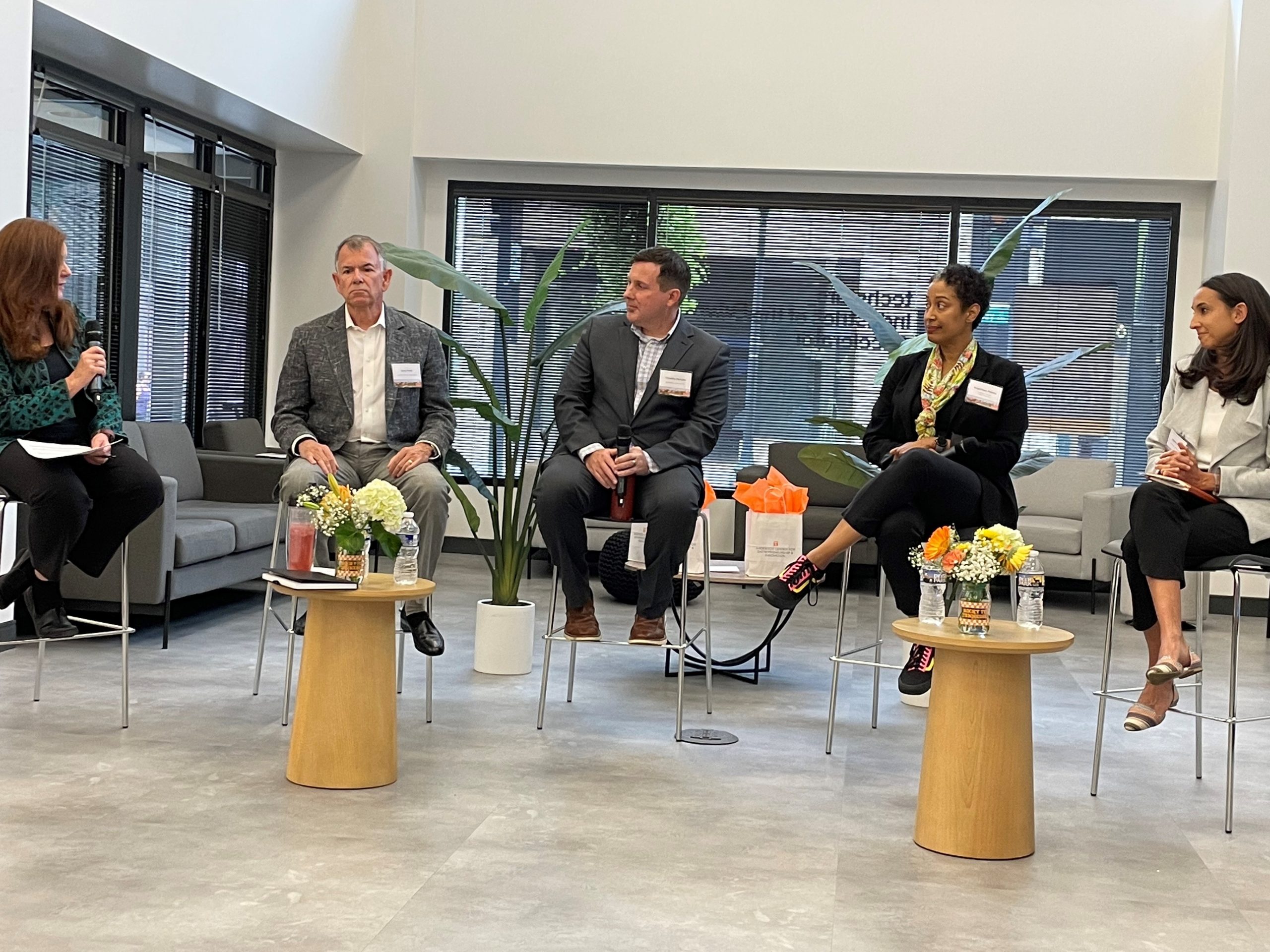
It’s important to have the right people on the bus and the wrong ones off the bus
That concept set the stage for the discussion during the inaugural “Bridging Research and Practice” forum hosted late Wednesday afternoon by the Anderson Center for Entrepreneurship and Innovation.
Late Wednesday afternoon at the Techstars space in downtown Knoxville, close to 50 people gathered to listen to a serial entrepreneur, a former corporate executive who never considered entrepreneurship until COVID-19, and two researchers, including one who started his own company.
The event was the inaugural “Bridging Research and Practice” forum hosted by the Anderson Center for Entrepreneurship and Innovation (ACEI) in the Haslam College of Business at the University of Tennessee, Knoxville. The topic was building internal and external support networks – how it worked in practice and what the literature says.
Over a nearly 60-minute conversation that was facilitated by Melissa Cardon, ACEI’s Research Director, the four panelists shared their insights and experiences. To set the stage, she quoted colleague Shawn Carson, a longtime player in the local start-up scene, who is famous for saying it is important “to get the right people on the bus and the wrong people off the bus.”
Serial entrepreneur Gary Pratt, Chief Executive Officer (CEO) of Surgical Review Corporation, joined Angelique Adams, Chief Executive Officer (CEO) of Angelique Adams Media Solutions, as representatives of the entrepreneurial community. Adams was a longtime corporate executive who more recently became an entrepreneur, while Pratt successfully launched seven companies, sold four of them, and served as a Partner in the nation’s sixth-largest accounting firm and President of a division of Waste Management.
Faculty participants were Jessica Jones, Assistant Professor in the Haslam College and one of the inaugural ACEI Research Fellows, and Timothy Munyon, Professor of Management in the Haslam College and Co-Founder of Red Castle Human Capital.
Pratt offered insights from his diverse experience with a variety of businesses. For example, he invoked lyrics from Hey Jude, the Beatles’ signature song, to make a point about the right and wrong people on the bus. Initially, you need implementers and later managers, but they might not be the same team. Above all, he said, “You need people who can see the (start-up founder’s) vision,” adding those are individuals who can “take a sad song and make it better.”
It was just one of several memorable quotes he uttered during the event. Another was one Pratt repeated a couple of times. “Every day is not going to be puppies and kittens,” he said, a reminder that entrepreneurship is tough, not for the faint of heart, and demands endurance. Pratt also talked about the Winnie the Poo character “Eeyore” who is always pessimistic, somewhat down-trodden (note the tacked-on tail), and glum. He used the reference to the character to say that we need to have devil’s advocates on our teams to keep us grounded.
Our favorite, however, might have been this one where he said, “Every entrepreneur needs a Vietnam.” It was a reference to a scare – misreading the market, running out of cash, or problems within the team – that reminds the founder to stay true to the vision and ensure others on the leadership team do so, too.
Munyon said academic research underscores the point that Pratt made about the talent needed at different stages in a start-up’s life. “At the beginning, people have to be generalists,” able to perform multiple tasks. Later, a start-up will need other skill sets.
“You don’t need all A players, but you need them in key roles,” Munyon said, drawing an analogy with the critical role of a pitcher on a baseball team.
So, what causes start-ups to fail?
Munyon said that 25 percent of those new ventures that fail occur around the founding team, and a key reason is inadequate communication. He advocated for “structured touchpoints.” Cardon added that research shows that failure frequently occurs when things begin to take off for a start-up.
Jones earned her Ph.D. from the University of Colorado – Boulder, a choice she made because of the start-up ecosystem in the city including the presence of Techstars. She talked about four key ingredients for successful entrepreneurial communities. They are four Ps: (1) places and how they matter; (2) people and how they matter; (3) programs and how they matter; and (4) property, as in intellectual property, and how it matters.
Citing how Route 128 in Boston and Silicon Valley evolved in different ways, Jones talked about the latter’s culture of trust as a key factor. Later, in response to a question about ways that Knoxville can better support its entrepreneurs, she talked about “generalized reciprocity” where individuals and organizations provide help without an expectation of any payback.
Adams explained that her business was founded two years ago and is “teeny tiny.” Yet, she is also a mentor and advisor to other entrepreneurs, so she had some important insights to share. She said that many entrepreneurs do not recognize they need support, instead simply “pushing through.” They are also slow to seek out mentors beyond their comfort zone which is frequently the technology arena.
The final piece of advice she offered regarded selecting board members and investors. “It’s flattering to have people (who) want to help you,” but Adams urged a cautious approach to ensure there was alignment around mission, vision, and values.
Like what you've read?
Forward to a friend!

